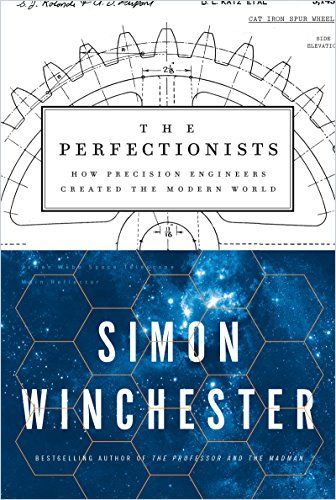Bestseller Simon Winchester, OBE, presents a fascinating history of humans attempting to create precision, all in the face of the natural world’s indifference.

Granular Perfection
In this New York Times bestseller, Simon Winchester, OBE – an Oxford-educated raconteur with a wry sense of humor and of drama – proves a wise historian who guides you from Ancient Greece’s Antikythera mechanism to the Seiko quartz watch. Winchester shows that he’s at heart a moralist as he pursues how the soul of machines evolved. In this inquiry into perfection, Winchester cautions that humans must balance the precision of the industrial world with the more powerful imprecision of the natural world.
The New York Review of Books described Winchester as “…a longtime journalist turned author, a meticulous researcher and catholic thinker.” Booklist called this book, “Another gem from one of the world’s justly celebrated historians specializing in unusual and always fascinating subjects and people.” And Publishers Weekly wrote, “Winchester’s latest is a rollicking work of pop science that entertains and informs.”
Measurement and Tolerances
Winchester begins by noting that standardized units for measuring distance, weight and time were a hallmark of early civilizations. The method of measuring time, he explains, evolved from determining the length of a second as measured by a sundial, to measuring a second using an atomic clock – and then using quantum logic clocks and optical clocks.
Precision is something that developed over time; it has grown and changed and evolved, and it has a future that is to some quite obvious and to others, puzzlingly, somewhat uncertain.Simon Winchester
These sensitivities reflect a link between time and gravity, and Winchester reveals, a fundamental truth: Gravity grounds humanity.
Measurement
Winchester clarifies that “precision” refers to manufactured metal, glass or fired ceramics but not to wooden objects; wood is organic and has no fixed form.
The concept of precision emerged, the author discloses, from the Antikythera mechanism of second-century BC Greece, perhaps the first analog computer. Winchester describes a device the size of a phone book with synchronized gears, dials, a hand crank and some 3,400 letters inscribed on brass. Winchester emphasizes its precise design and inherent inaccuracy.
Winchester relates how horologist John Harrison first devised a series of clocks for measuring longitude and later made sextants, octants and astrolabes by hand that lasted three centuries and added to knowledge that enabled Britannia to rule the seas.
Precision, the author clarifies, doesn’t mean perfecting a single piece; it involves duplicating something repeatedly, economically. He cites as an example mid-1700s British Royal Navy solid-cast cannons featuring a hole bored through solid iron. Winchester credits this breakthrough to genius John Wilkinson, who collaborated with James Watt on the steam engine.
Winchester points out the irony that an unintended consequence of the pursuit of precision is that, at some point, even the best human workers can’t meet its standards.
The relative paucity of human supervision in engineering fields where human lives are at stake…has steadily become a more pressing concern.Simon Winchester
Winchester asks you to consider the $2 billion, 13-ton Hubble Space Telescope. In April 1990, the space shuttle Discovery placed it in orbit at 17,000 miles per hour, 380 miles above Earth. Its photographs, he laments, were out of focus. The Hubble’s main, eight-foot-in-diameter mirror – the most intricate optical device ever made – suffered, Winchester recounts, from one improperly ground part of the lens; it was off by the thickness of a human hair.
NASA, Winchester celebrates, performed a LASIK-like surgery using corrective lenses and mirrors. The author shares that optical engineer Jim Crocker had noticed that the shower head in his hotel room moved up or down on a vertical rod and angled according to user preference. Crocker thought a similar design could place the new corrective optics, and, Winchester details, the repair went perfectly.
GPS
Winchester names US Naval officer Roger Easton as the main inventor of the Navstar Global Positioning System (GPS). Inaugurated in 1978, the application was military but, the author reveals, gradually entered civilian life.
Winchester breaks down the GPS system into its 31 satellites about 12,000 miles above Earth. GPS, he notes, is also a system of clocks, accurate to tiny fractions of a millisecond.
A confident Intel executive once remarked that the number of transistors on a chip made in 2020 might well exceed the number of neurons in the human brain.Simon Winchester
Winchester states that Moore’s law predicts that each year – or, as revised, every two years – computer chips will become half their current size, with twice the power and speed. The author reports that in 2016, Intel’s Broadwell family of chips reduced chips to 14-billionths of a meter, the size range of the smallest virus, with each chip holding seven billion transistors.
The Natural World
Winchester conveys how the Japanese grant precision and imprecision equal cultural value. They regard the machined excellence of a Seiko quartz watch as no more worthy than the handcrafted perfection of a Samurai sword or the Kyoto temple architecture.
Before the imprecision of the natural world, all will falter, none shall survive – no matter how precise.Simon Winchester
Winchester reminds readers that nature will eventually envelop all human creation, regardless of its precise design.
Brilliant and Bemused
Simon Winchester gained deserved renown for his insightful reporting on major news events. He turned to nonfiction books with equal success. Though his education and erudition are highbrow, he writes in a fast-paced, accessible bestseller language – easy to read, easy to retain and, best of all, easy for readers to grasp his almost bottomless irony and bemusement at the doomed human quest for perfection. Winchester’s perspective on that provides his own meditation along with the considerable facts he conveys: He’s almost a nihilist, but he enjoys the human saga too much for that.
Simon Winchester’s bestsellers include Land; The Professor and the Madman; Krakatoa; The Map That Changed the World; A Crack in the Edge of the World; The Men Who United the States; and Pacific.




